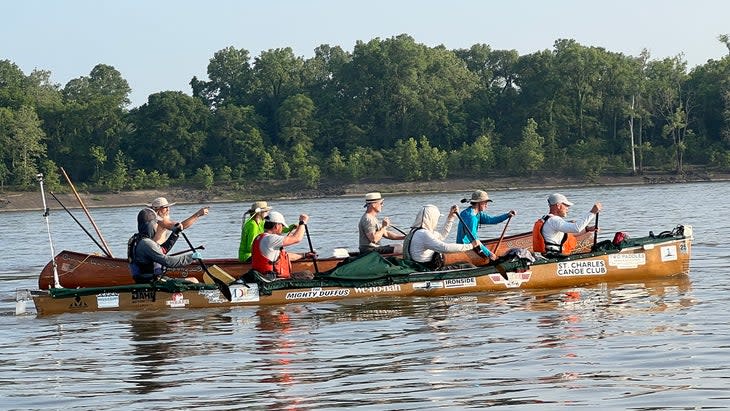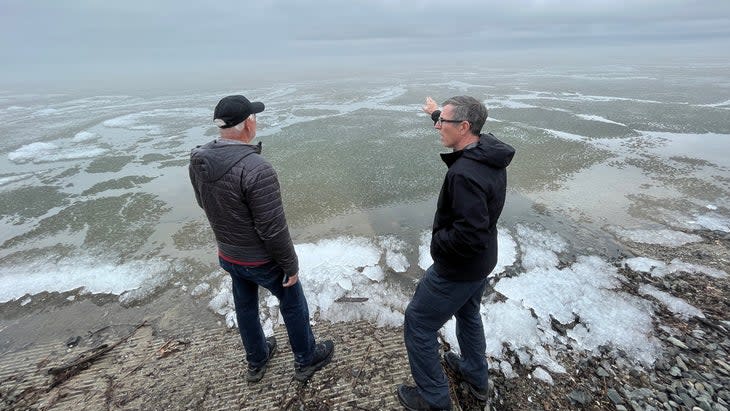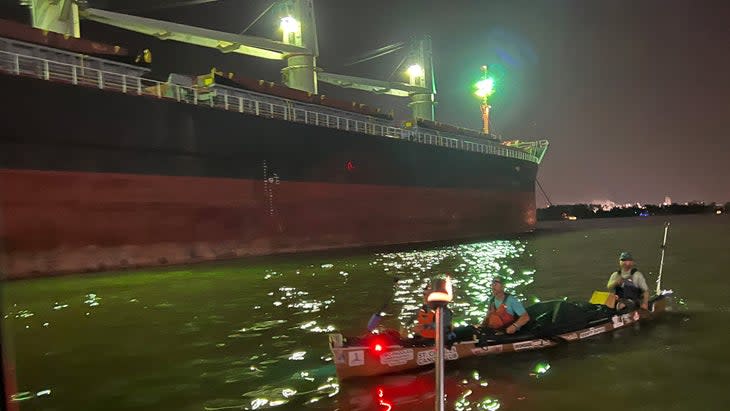A Record-Breaking Paddle Down the Mississippi River
This article originally appeared on Outside
In 2021, Scott Miller, a 47-year-old nurse from Minneapolis, made his first attempt to break the record for paddling the entire 2,350-mile length of the Mississippi River. At the time, the fastest known time for completing the journey was 18 days, 4 hours and 51 minutes. But on May 21 of that year, near mile 2,200, after 16 days of paddling for 24 hours a day--[[this doesn’t need to be in em-dashes, should jsut be commas, his team's boat sank in heavy waves just north of New Orleans. They'd come so far, and been so close to the finish line, only to fail. The result left a bitter taste in Miller's mouth.
Two weeks later, Miller sat down with his crew chief, Michael "Moose" Dougherty, at an Irish bar in St. Paul, Minnesota. Over Guinnesses, Miller made his pitch: "I'm not going to beat around the bush," he said. "I'm going again, and I need you to be crew chief."
Dougherty suspected this was coming. Before driving to the bar he had planned to say no, and he even told his wife there was no way he could do another attempt. A Mississippi River paddle is a huge project, with many risks. And yet, Dougherty heard the words come out of his mouth like someone else was saying them: "Okay," he told Miller. "I'll do it." They decided to plan for the spring of 2023.
The project pitted Miller against his rival, K.J. Millhouse, 65, an executive coach and longtime paddler. Millhouse and his paddling team, called Mile Marker Zero, had broken the record in 2021, completing the trip in 17 days, 19 hours, and 46 minutes, and he had also set a previous record in 1980. Miller and Millhouse had planned to team up for a 2020 attempt, but the crew had fractured and the attempt was scuttled. Instead, they each had organized separate teams for dueling 2021 attempts.
After his 2021 failure, Miller thought about everything that had gone right--teamwork, planning, organization--and what went wrong, namely the weather. He knew he could improve the journey. He would modify his boat, bring on different paddlers, simplify their nutrition, and streamline their gear. The only thing remaining from his 2021 voyage was Dougherty, a retired corporate PR flack with a love of endurance sports.
Miller, the founder and leader, called his new team Mississippi Speed Record. He recruited a squad of expert paddlers, first bringing on Paul Cox, a digital media editor who was a two-time winner--and current record holder--of the Alabama 650 paddling race. Next to join was Wally Werderich, a Chicago public defender who'd placed second and third in the Missouri River 340 and had won two national titles. There was Judson Steinback, the 2022 Masters national champion for men's and mixed canoes. And waiting in the wings as a backup paddler was Joe Mann, also a winner of the Alabama 650.

The team had plenty of paddling power. Miller thought that with good weather, good water, and good luck, they could beat the record. And if they couldn't, maybe nobody could.
Miller planned to launch on May 3, 2023. But the long winter with heavy snow meant that Minnesota's Lake Winnibigoshish, a huge shallow lake near the start of the route, was still choked with ice. They would need to cross its 16 miles in their first 24 hours. Even without ice, Winnibigoshish is one of the most dangerous places on the river, because even a slight wind can produce huge waves.
They pushed the launch back to May 7, gathered at Dougherty's cabin in northern Minnesota, and waited for the ice to melt. Every day, someone went to check the frozen lake. With each new report, the initial excitement waned, and a restlessness grew. The paddlers had hard deadlines, jobs, and lives to return to. If they couldn't go by May 11, Werdrich, for one, was out. Other team members had similar deadlines.
Finally, on May 9, the paddlers found the lake largely clear, save for about a mile of candle ice, which crumbles and can be plowed through if necessary. The choice seemed to be: Go now, or don't go at all. They decided to launch.

That afternoon, some members of Miller's 20-plus person support crew drove to Lake Itasca, the river's official starting point. The supporters set up camp, while the four paddlers attempted to get one last night of sleep. At 3:30 A.M., the support crew woke up in their tents and began readying the canoe.
The boat was a 23-foot Wenonah Minnesota Four--the same model used on Miller's previous attempt--only with several modifications. Like the previous boat, the new one had bulkheads installed to help keep water out of the middle two seats. For much of the journey three of the men would paddle while the fourth slept in the boat. New to this boat was a battery system to power lights, an iPad for navigation, and GPS trackers.
Early light began to filter through the trees. Once the canoe was ready, support crew members wheeled it down to the water, where the paddlers were waiting. The four men got in and paddled across Lake Itasca to the row of large stones where the water spills over and the Mississippi River begins. Then at 6 A.M., the paddlers walked the canoe over the rocks and past a small footbridge, and set off down the river.
The water was high and fast. The canoe wound through the marshes, following the river. Almost immediately, they started picking up time. After the first morning, they were ahead of 2021 record pace by an hour.
By evening they arrived in the city of Bemidji, where the support crew passed the team spray skirts to protect them from the icy water, and switched out the battery powering the iPad, Garmin tracker, lights, and the bailer.
Around 5 P.M., they set off across Lake Bemidji. The ice had just melted there too, and the water temperature was 46 degrees--deadly cold if the canoe flipped and they couldn't get back in. By 1:30 A.M., they arrived at Lake Winnibigoshish, and saw that the ice was gone. After crossing the lake's glassy surface for the first half of the 16-mile journey, the paddlers encountered winds and high waves, and water pounded the canoe. Still, when they completed the crossing, they were 4 hours and 20 minutes ahead of record pace.
The river turned south. The water was still dangerously high, and it was raging over dams in some sections. In some places, the paddlers simply cut straight through flooded areas of forest. Their lead grew to five hours, then six, then seven. By the time they reached Minneapolis in the middle of the night, they were 12 hours ahead of record pace.

But the river gives, and the river withholds. Miller knew the lead couldn't be taken for granted, and that a 12-hour advantage could disappear amid bad weather or a stop to repair the canoe. In St. Paul, the team picked up two support boats, which would follow them all the way to then end, if they made it that far.
The next day they reached Lake Pepin, another shallow, dangerous lake. For five hours, they paddled into a headwind, battling four-foot waves for the lake's entire 22-mile length.
In 2021, both Millhone's and Miller's teams encountered huge storms and high winds. But in 2023, the weather was calmer overall. The paddlers endured one night of cold soaking rain, but as they moved south, the sky cleared and the river remained glassy. Favorable conditions, combined with the high water up north and the strong paddlers, added to the team's lead. By the time they reached Iowa they were 20 hours ahead.
The physical effort, however, was the same for every inch of voyage: one stroke after another--more than a million, by my estimate--down all 2,350 miles of the Mississippi. Eat, drink, sleep, excrete (don't ask), and paddle. With four guys living together in such close quarters, the canoe was like a soggy bachelor pad. A slurry of liquid collected in the bottom that the paddlers called "people soup," which the motorized bailer simply could not expel. Instead, the support crew would occasionally clean out the boat, and try to reestablish a modicum of hygiene for the team.
On most days, the heavy current was a blessing. But one night, at Lock & Dam 15 in Iowa, the river's power nearly ended their journey as they were waiting to pass through the lock. The lock master told them to paddle to river right, which was above the dam. They followed the order, but once they reached the sheer concrete wall on that side of the lock, the current was so strong it started pulling them toward the dam.
They navigated the boat upstream, but the boat continued moving toward the dam. Cox and Werderich were sleeping in the bottom of the boat as the team neared calamity. They woke up to Steinback yelling, "Get up, now!"
"It was like a 1,000-percent sprint," says Steinback. "It was one of the most harrowing moments of my entire life."
Even with the added muscle, their boat continued its backward drift. They radioed the support boat, which came alongside, and the men held onto it as it motored them away from disaster. It was a close call, but Mississippi River record attempts are full of near misses.
"I woke up like every night to--I don’t want to say screams from above," says Cox, "but let’s say, urgent commands."
Below the dam, the team decided to rest, sleeping for three hours before paddling on. In the ensuing days they gained back the lost time and added ten more hours to their advantage. For several days, their lead over the 2021 record hovered at 30 hours. But as they got closer to the Gulf of Mexico, the team encountered barge traffic and ocean-going ships. On several occasions, they had to stop to let the massive boats pass.
"When you get down to Baton Rouge," says Cox, "It's like you're playing Frogger trying to get across. You're a tiny little blip on the radar screen."
The team decided that it was okay to sacrifice an hour here and there to avoid the barges and ships. As a result, their lead dropped from 31 hours, to 28, to 25, as they got closer to Louisiana. North of Baton Rouge, the margin fell to 22:47, even though they were paddling up to 170 miles a day.
With around 200 miles left, they sped up, pushing the lead back up to 23 hours. They passed the place where Miller sank in 2021 and sped through New Orleans, then through the bends further south. They paddled down the last stretch of the Mississippi as night fell on Friday, May 26.
Around 2 A.M. on Saturday, they came into the area known as the "Head of Passes," where the river splits into three channels. There sits a rickety wooden structure called Mile Marker Zero which marks the official end of the Mississippi River.
The team paddled toward the area with several boats alongside them; one was loaded with cheering family and support crew. But even though the team was nearing the end, Miller refused to allow himself to celebrate until they had reached the official finish line, which was marked by a shining light against the dark river.

"There are so many things that can happen at any moment," Miller said. "Even at the very end, we didn't know exactly where we were going, and everybody was screaming and yelling which light to aim for. I was like, 'Oh my God, we’re going to hit a buoy!'"
Finally someone found the right light, and they headed for it. At 2:15 A.M., they finally arrived at Mile Marker Zero. They tied up the boat, then the four paddlers--Cox, Werderich, Steinback, and Miller--climbed on the platform.
"I was crying because there were so many emotions," Steinbeck says. "It was all adrenaline, euphoria, gratitude, and just immense fatigue. But when I climbed up on Mile Marker Zero, I felt weightless. Like there was no effort at all."
The air was filled with the cheers and airhorns--celebration and victory. They had beaten the 2021 record by 23 hours and 30 minutes, setting a new standard of 16 days, 20 hours and 16 minutes.
On top of Mile Marker Zero, in a small waterproof box, there's a log book that anyone who reaches the end of the river can sign. The paddlers opened it and signed their names.
"It felt like we just won the Super Bowl or something," Miller says. "It was just so much more amazing of an ending than I ever could have imagined."
For exclusive access to all of our fitness, gear, adventure, and travel stories, plus discounts on trips, events, and gear, sign up for Outside+ today.

